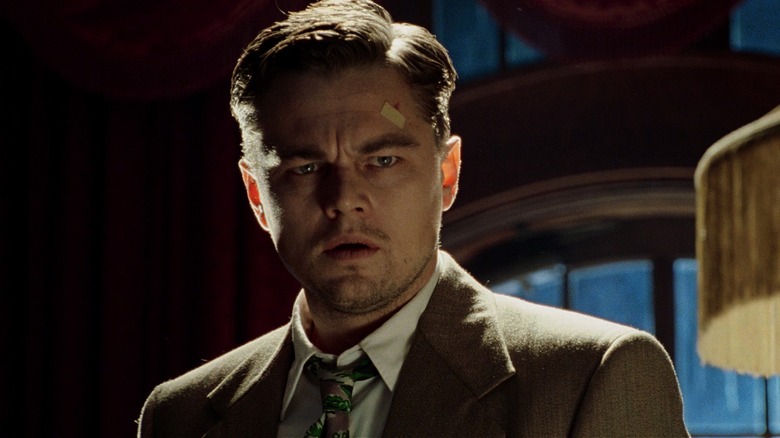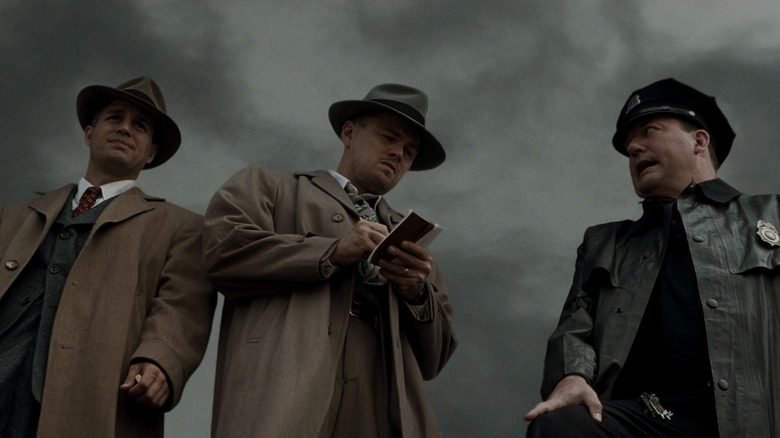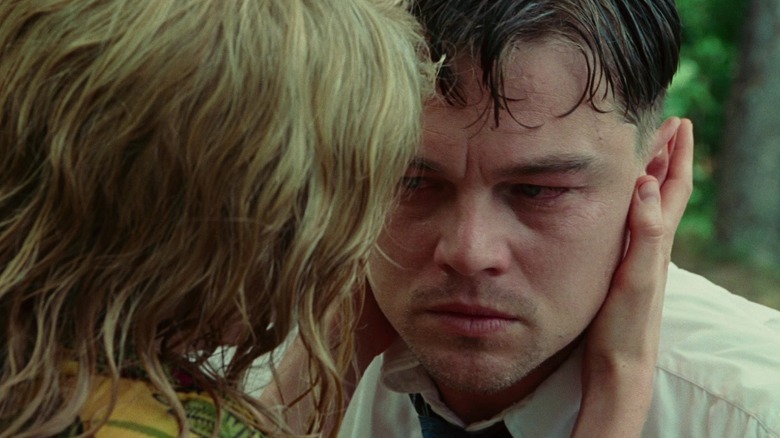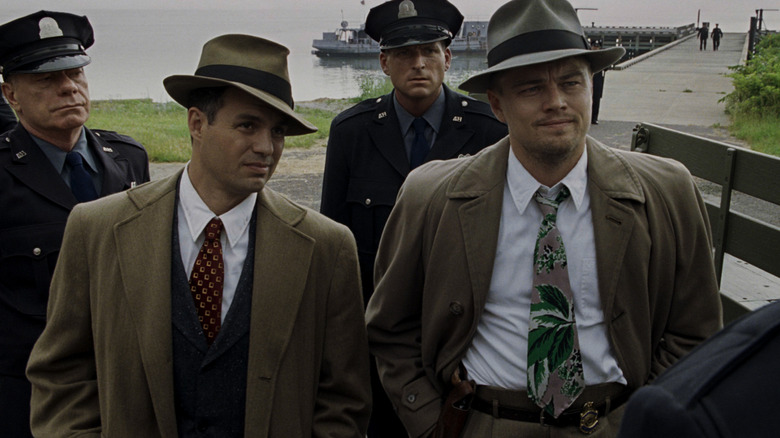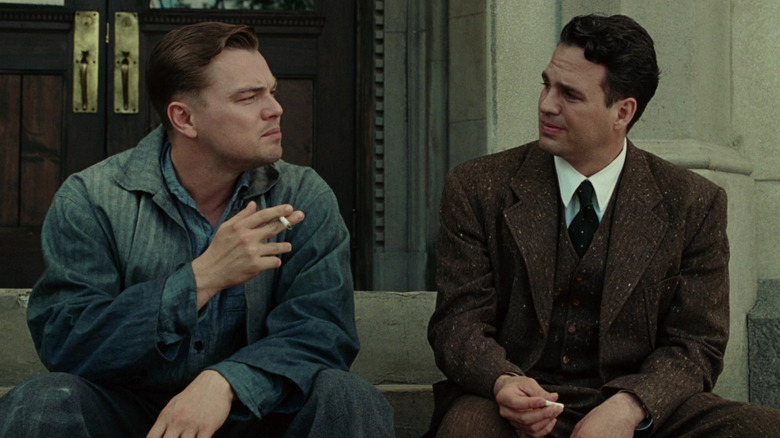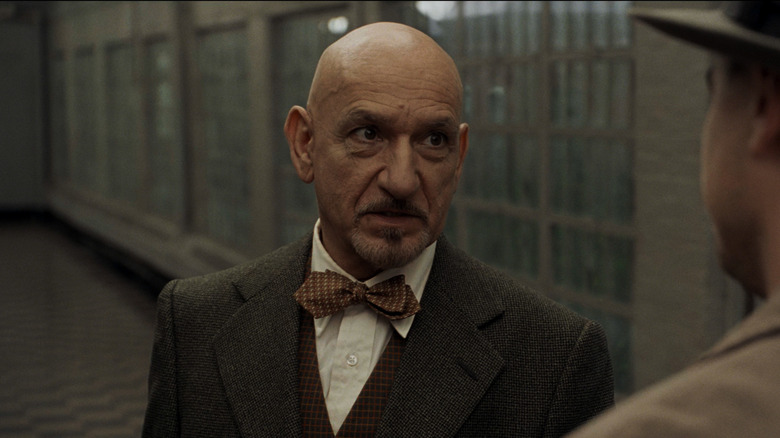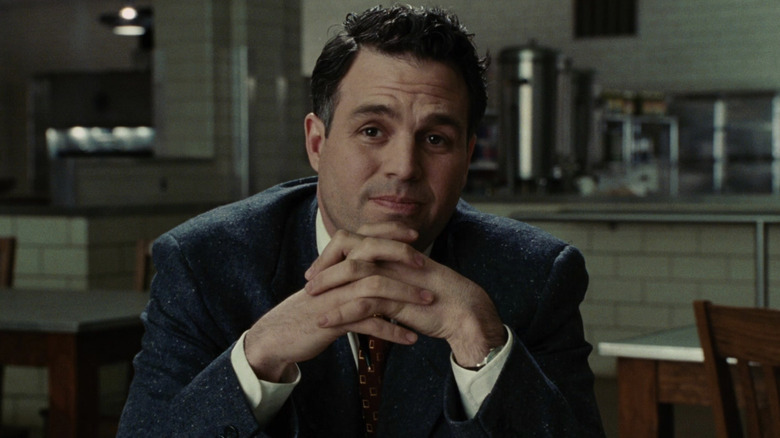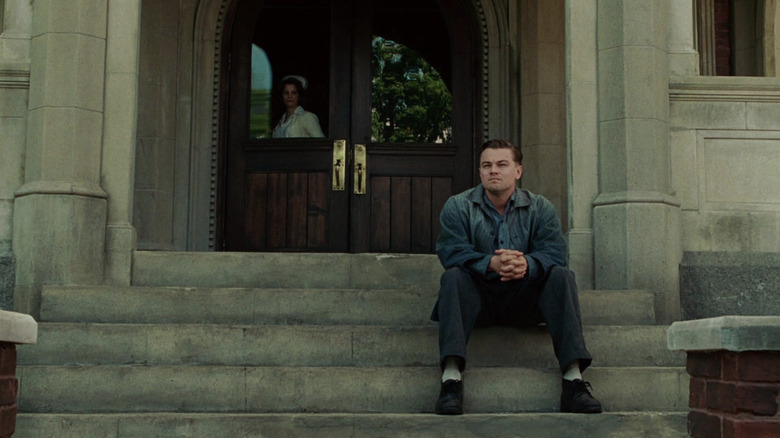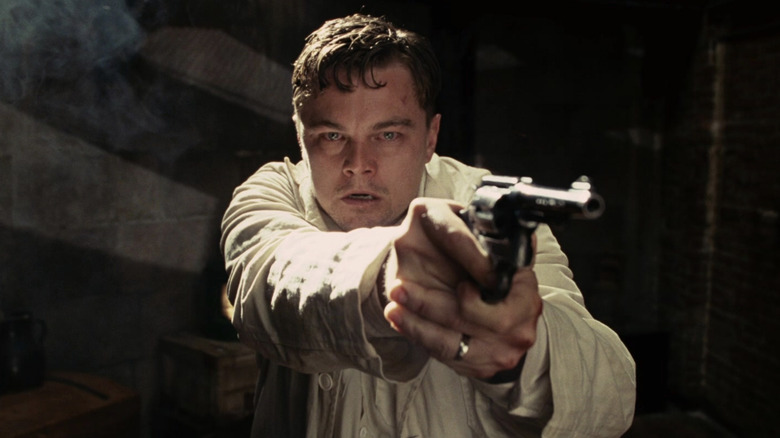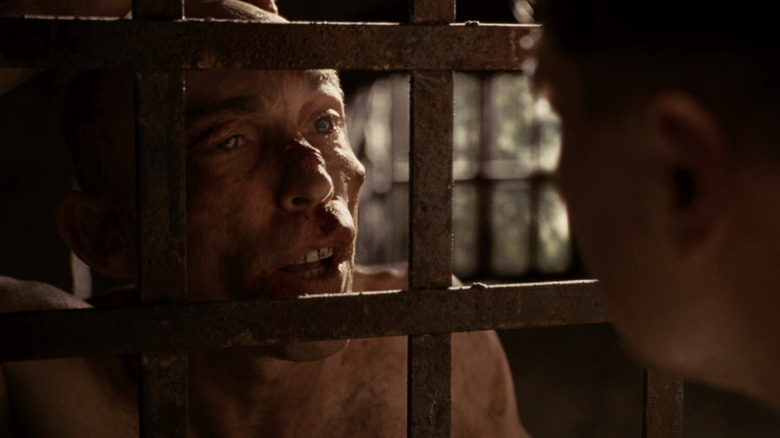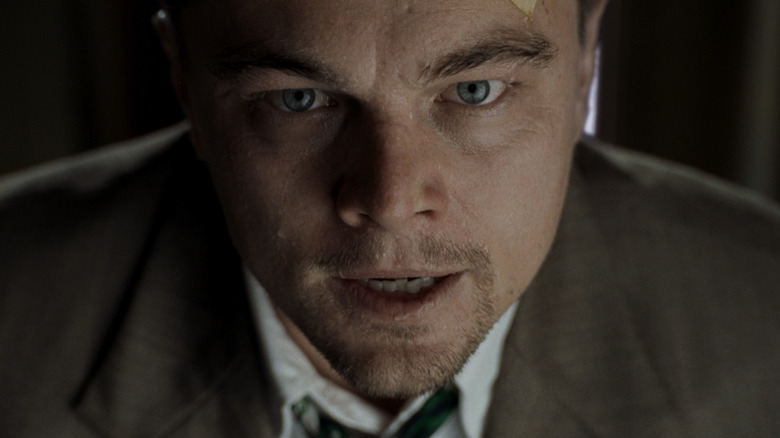Shutter Island Ending Explained: Was It All In His Head?
An isolated asylum, a missing patient, and a detective with a dark past ... What more could you want from a mystery movie? Based on a novel by Dennis Lehane, "Shutter Island" is the story of Teddy Daniels (Leonardo DiCaprio), a U.S. Marshal who goes looking for a missing patient near Ashecliffe Hospital and discovers so much more. In 2010, the movie was a box office smash because of its fantastic performances, creepy atmosphere, and completely haunting ending.
"Shutter Island" is full of confusing moments and subtle hints that only start to make sense when you think back through the story after knowing all the big plot twists. Like the best mystery movies, "Shutter Island" has multiple layers and a few seemingly contradictory clues that allow you to analyze the story through multiple lenses to reach different conclusions. The first time through, "Shutter Island" feels like a thriller, and though it might not go down as having one of the greatest twists in movie history, the ending will still stick with you. When you watch the movie a second time, however, Teddy's character takes on a whole new dimension, and the ending of his story becomes even more complicated. No matter how you look at it, the ending of "Shutter Island" is tragic, but just how dark the story gets depends on what you think is happening in Teddy's mind when the movie comes to a close.
What you need to remember about the plot of Shutter Island
The year is 1954 and United States Marshal Teddy Daniels (Leonardo DiCaprio) is seasick while taking a ferry to Shutter Island to investigate a disappearance. On the deck of the boat Teddy meets up with his new partner Chuck (Mark Ruffalo), and the two of them start to discuss the details of the case. Rachel Solando (Emily Mortimer), a patient at the Ashecliffe Hospital for the criminally insane, has recently gone missing.
Once on the island, Teddy and Chuck are introduced to Dr. Cawley (Ben Kingsley), who was overseeing Rachel's treatment. As Teddy begins digging into the investigation, he also starts experiencing strange hallucinations and flashbacks to a past he doesn't quite recognize. Other patients at Ashecliffe convince Teddy that something suspicious is happening on the island, and they tell him that Dr. Cawley takes patients to a nearby lighthouse to lobotomize them.
Teddy gets separated from Chuck, and while Teddy's searching for his partner, he runs into a new woman claiming to be Rachel Solando (Patricia Clarkson). She tells Teddy that Dr. Cawley is experimenting on patients with mind control techniques, and warns him not to trust the doctors. Teddy goes to Dr. Cawley for answers about Chuck's whereabouts, but the doctor insists that Teddy never had a partner when he arrived on the island. Teddy becomes convinced that the doctor has kidnapped Chuck and taken him to be lobotomized. Teddy heads to the lighthouse ready for a big confrontation, but he's completely unprepared for what he discovers there.
What happened at the end of Shutter Island
When Teddy finally reaches the lighthouse, Dr. Cawley is waiting for him. Dr. Cawley explains that Teddy has been a part of an experimental procedure this entire time. According to Dr. Cawley, Teddy is actually a patient at Ashecliffe Hospital, and his real name is Andrew Laeddis. Dr. Cawley says that Andrew murdered his wife after she drowned their three children during a depressive episode. Because he couldn't live with the guilt, Andrew created the Teddy persona to retreat from reality.
At first Teddy doesn't want to believe Dr. Cawley's story, but there's evidence to the doctor's claims, like Teddy's seasickness and hallucinations, which are really just the result of him going through withdrawals after years of taking psychiatric meds. Chuck also arrives to confirm the doctor's story, and he tells Teddy that his real name is Dr. Lester Sheehan. The doctors had hoped that in letting Andrew play through his imaginary scenario as Teddy, he would finally accept the truth.
After speaking with both doctors, Andrew comes to believe their story. Dr. Cawley explains that if Andrew withdraws and becomes Teddy again, they'll have no choice but to lobotomize him. At the very end of the movie, Dr. Sheehan is talking to Andrew, who suddenly slips into the Teddy persona. The movie leaves us wondering if "Teddy" really believes he's a US Marshal, or if Andrew is choosing to get lobotomized so he doesn't have to remember the truth of what happened to his wife and children.
What was Teddy's real life story?
The ending of "Shutter Island" leaves us with a major question. Was Teddy or Andrew the real identity of the movie's protagonist? There are countless details in "Shutter Island" you only notice on a rewatch, and most of them can be interpreted in multiple ways. Teddy's interactions with the patients of Ashecliffe seem like blatant foreshadowing once you know the Andrew Laeddis twist. On the other hand, the conversation Teddy and Rachel have about mind control lends some credence to the theory that Dr. Cawley really is evil and manipulative.
The fact that "Shutter Island" can be interpreted in multiple ways is part of what makes the movie great, but the plot itself provides a little more evidence for Andrew's tragic backstory than for any mind control experiments. Teddy as a character has no past, no real family connections, and his memories seemingly begin on the boat approaching the island. Andrew has a real story, and once you know it, you can see why so many of the side characters in "Shutter Island" approach Teddy with caution. They know he can be violent and unpredictable, but some of them still try to let him know that Dr. Cawley is running an elaborate experiment on him. It seems pretty clear that Teddy and Andrew are the same person — but that makes his decision at the end of the movie even more interesting.
What does Teddy believe at the end of the movie?
In the last scene of "Shutter Island," Dr. Sheehan goes to talk to Andrew to see how he's adjusting after the large-scale roleplaying experiment. The last time the two of them spoke, Andrew had seemed calm and clear-minded. For a moment, it looked like the treatment had worked, but when Dr. Sheehan approaches Andrew on the hospital grounds, things take a turn. Andrew starts calling Dr. Sheehan "Chuck" and talking about the details of the missing person case all over again.
There are really two ways to interpret Andrew's final conversation with Dr. Sheehan, and both of them have dark implications for the ending of "Shutter Island." It's possible that Andrew has slipped back into delusion and that nothing about the experiment worked. The sad truth of that reality is that Andrew simply couldn't overcome his mental illness. The other possibility is that Andrew really is cured, but now he's pretending to be delusional because he wants to be lobotomized. In either interpretation, the deep truth is that Andrew simply can't get past the guilt and trauma from what happened with his wife and children. Ultimately, he was doomed from the very start.
Was Dr. Cawley a villain?
Even though "Shutter Island" leaves some room for doubt, the end of the movie makes it pretty clear that Dr. Cawley really was trying to help Teddy/Andrew throughout the movie. He thought that by playing along with the fake investigation, Andrew would eventually discover the truth about himself. Dr. Cawley wasn't some supervillain constructing a foolproof mind control technique, but that doesn't necessarily mean he was a good guy.
We see plenty of signs that Ashecliffe Hospital isn't a particularly nice place to live. Some of the patients are kept in tiny cells in decrepit buildings. Many of them face violence from other patients like Andrew himself, and it seems like plenty of them also live in fear of overstepping Dr. Cawley's rules and getting lobotomized. Dr. Cawley likely had some real empathy for Andrew, but the truth is that he designed the whole experiment for his own purposes. Dr. Cawley is ambitious and wanted to prove to the world that he could cure Andrew, even if that meant performing a dangerous experiment where Andrew had free reign of the entire island. That qualifies him as a minor villain, at the very least.
How does Chuck affect the ending's meaning?
Dr. Sheehan doesn't directly intervene in the plot of "Shutter Island," but he's one of the stand-out characters the second time you watch the movie. Dr. Sheehan poses as Chuck, Teddy's partner, and he is part of the big clue everyone missed early in the movie. The first time we see Teddy and Chuck together, they're introducing themselves to each other on the deck of the ferry to Shutter Island. Real U.S. Marshals would have met at the office or the pier, but Dr. Sheehan is just delivering his lines in the opening scene of Andrew's delusion. The strange meeting doesn't necessarily stand out on a first viewing because it's also the opening scene of the story from the audience's perspective.
The fact that Andrew's delusion includes Chuck at all shows that he's come to trust Dr. Sheehan in the years they've worked together as doctor and patient. To a certain extent, Andrew really views Dr. Sheehan as a partner, even though he resists his own treatment. In the final scene of the movie, Andrew seemingly slips back into his delusion and calls Dr. Sheehan Chuck again, but that might also be his way of saying goodbye to the closest thing he has to a friend.
How was the original book's ending different?
"Shutter Island" is a shockingly faithful adaptation of Dennis Lehane's 2003 novel of the same name. Screenwriter Laeta Kalogridis managed to capture the eerie atmosphere of the novel's version of Ashecliffe Asylum, and she basically recreated every plot beat from the book, too. The book gets to spend more time soaking in the procedural elements of the investigation, but the thriller-like pacing of the "Shutter Island" movie doesn't force any sacrifices on the mystery plot.
The ending of "Shutter Island" is the only point where the movie goes in a slightly different direction than the book. In Lehane's novel, there's next to no ambiguity in the ending. From the book's perspective, Andrew has completely regressed and really does believe that he's Teddy again during his final conversation with Dr. Sheehan. The movie's version of Andrew/Teddy hints that he may be just pretending in order to get the lobotomy, but the book closes with Teddy plainly and simply restarting his investigation and falling back into the delusion once more. While there's a less enticing sense of mystery at the end of the novel, Lehane's version of the story comes across as significantly more tragic for Andrew and everyone who tried to help cure him.
What has Martin Scorsese said about Shutter Island?
Martin Scorsese and "Shutter Island" turned out to be perfect for each other. When the movie debuted, it quickly became the highest-grossing film of the director's career. With a total worldwide box office take of almost $300 million, "Shutter Island" is still Scorsese's second-most financially successful film after "The Wolf of Wall Street." What drew Scorsese to the project initially wasn't the promise of a massive box office but the movie's script itself.
In an interview with Gofobo, Scorsese said that he got so hooked by the "Shutter Island" script that he stayed up late into the night to finish it. When he got to the end, he instantly felt compelled to reread the script from the beginning. "Each scene is different once you know the playout of the piece. Each scene is actually many different levels of reality," Scorsese said. He added that he was particularly drawn to the way the script presented "the idea of the puzzle, the idea of the labyrinth, the psychological and emotional labyrinth that all of us have, that all of us are in, in a way, internally."
Scorsese was drawn to the layered mystery of "Shutter Island," and that helps explain why his version of the story stays so ambiguous to the very end. The mystery of Teddy's real identity was already layered throughout the original narrative, but Teddy's final scene with Dr. Sheehan in the screenplay adds one more unexpected level to the labyrinth.
What has Dennis Lehane said about Shutter Island?
Novelist Dennis Lehane's version of "Shutter Island" is a horribly tragic tale. In the very last page of the book, everything that happened throughout the story comes undone as Andrew regresses back into his Teddy persona and seals his own fate. In the book, Teddy is fully consumed by his delusion, but the movie ends with Teddy asking Dr. Sheehan if he'd rather live as a monster or die as a hero. That question has convinced some people that in the final moments of the movie, Andrew is just pretending to be delusional. They think he's consciously choosing to get lobotomized because of his guilt.
One person isn't convinced: Lehane. In a conversation with Andy at the Movies, Lehane talked about the pivotal line that was added to the movie. He explained how he imagines that line still feeding back into his original idea for the ending. "Personally, I think he has a momentary flash. To me that's all it is. It's just one moment of sanity mixed in the midst of all the other delusions." Lehane said that he doesn't think the protagonist of "Shutter Island" would actively choose to get lobotomized. In his mind, the question is just a brief moment of clarity before everything falls away again. From that perspective, the question is less for Dr. Sheehan and more for the audience. It's a way of considering everything that happened to Andrew Laeddis and recontextualizing what we might think about his fate.
Why has there never been a Shutter Island sequel?
Based on the box office performance alone, it's a little strange no one ever tried to make a "Shutter Island" sequel. Off an $80 million budget, the movie earned just under $295 million globally. That's the kind of return that film studios can only hope to achieve, but of course, sequels still need stories, and "Shutter Island" doesn't leave much room for a follow-up. Teddy/Andrew's story is all but done, and explaining more in a second film would ruin the mystery of the original's ending. At the same time, if we assume that Dr. Cawley isn't developing a secret mind control treatment, then there really just isn't much left to explore at Ashecliffe Asylum from a storytelling perspective.
Maybe "Shutter Island" could have been a candidate for a spiritual successor, but it doesn't seem like anyone has much interest in making that a reality. Dennis Lehane, the author of the 2003 novel, has written several books over the past couple of decades, but none of them have been about asylums. Screenwriter Laeta Kalogridis went on to write "Terminator Genisys," "Alita: Battle Angel," and more recently "Another Simple Favor," but she's yet to pen another mystery thriller quite like "Shutter Island." Martin Scorsese and Leonardo DiCaprio have made some great films together since 2010, but they've all been worlds away from Shutter Island and Ashecliffe Asylum. This particular piece of 2010 movie magic is all we're getting, but that just makes "Shutter Island" a little more special.
